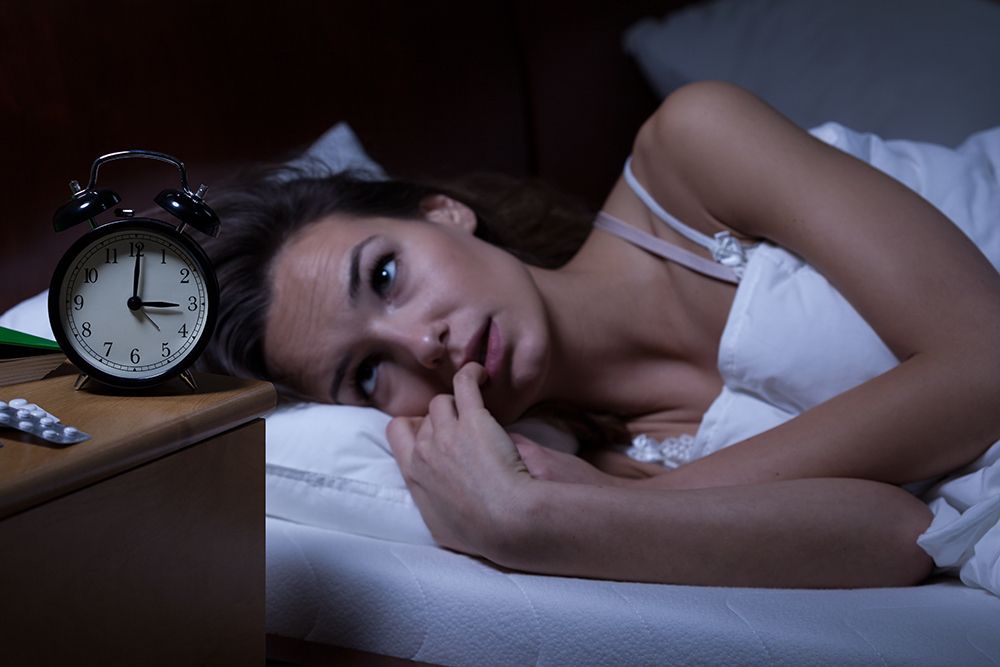Do you often feel exhausted during the day? Do you find yourself struggling to stay awake at work or during class? If so, you may be suffering from sleep disorders or trouble sleeping. Millions of people around the world are affected by sleep disorders, and many of them don’t even know it. In this blog post, we will discuss some common sleep disorders and how to get a good night’s sleep.
Contents
Is Trouble Sleeping Related To Sleep Disorders?
 Sleep disorder means having difficulty falling asleep, staying asleep, or both. It can happen at any age and to anyone. Many people have trouble sleeping at one time or another in their lives. There are high chances anyway to have sleep disorders.
Sleep disorder means having difficulty falling asleep, staying asleep, or both. It can happen at any age and to anyone. Many people have trouble sleeping at one time or another in their lives. There are high chances anyway to have sleep disorders.
For some people, it is a short-term problem related to stress at work, family problems, or jet lag from travel. But for others, the trouble sleeping can be long-lasting and caused by an underlying medical problem. Such as depression, anxiety disorder, chronic pain, heart disease, or Parkinson’s disease.
When you have trouble sleeping, it may be a sleep disorder that can make it hard to get the rest you need. You may not feel rested when you wake up in the morning even if you have slept for eight hours. As a result, you may have trouble with daily activities such as schoolwork, job performance, and relationships.
In fact, according to the National Sleep Foundation, about 50 to 70 million adults in the United States suffer from a sleep disorder. Therefore, it is important to pay attention.
Types of Sleep Disorders
There are many different types of sleep disorders, but some of the most common include:
- Insomnia: This is the most common type of sleep disorder and it refers to difficulty falling asleep or staying asleep. Insomnia can be caused by stress, anxiety, medications, and other medical conditions.
- Sleep Apnea: This is a serious condition in which you stop breathing for short periods of time during sleep. It can lead to daytime fatigue, high blood pressure, and other health problems.
- Restless Leg Syndrome: This is a condition that causes an irresistible urge to move your legs, especially when you’re trying to sleep. It can cause insomnia and disrupt your sleep.
- Narcolepsy: This is a condition that causes you to fall asleep suddenly and unexpectedly during the day. It can be very disruptive to your life and it can be dangerous if you’re driving or operating machinery when it happens.
- Sleep behavior disorder: REM sleep behavior disorder (RBD) is a condition that causes you to act out your dreams. You may kick, punch, or shout during REM sleep. This can be dangerous for you and your bed partner.
These types of sleep disorders can have a serious impact on your health, so it’s important to get treatment if you think you may face trouble sleeping very often. It may have resulted in a sleep disorder, talk to your doctor. He or she can help you figure out what’s causing your sleep problems and how to treat them.
Signs And Symptoms Of Trouble Sleeping
 There are a number of different sleep disorders, each with its own set of signs and symptoms. Such as;
There are a number of different sleep disorders, each with its own set of signs and symptoms. Such as;
- Insomnia: difficulty falling asleep or staying asleep.
- Sleep apnea: breathing pauses during sleep.
- Restless legs syndrome: an irresistible urge to move your legs.
- Narcolepsy: excessive daytime sleepiness.
It is important to identify the signs and symptoms of sleep disorders, as they can have a significant impact on your quality of life. If you are experiencing any of the above-mentioned signs or symptoms. Consider consulting with a healthcare professional.
Other than this, the symptoms of sleep disorders can also be physical, mental, and emotional. If you are experiencing any of the following, it is best to consult with a doctor.
- Feel tired during the day even after getting a full night’s sleep.
- You have difficulty falling asleep or staying asleep.
- Wake up frequently during the night.
- You snore loudly (this could be a sign of sleep apnea).
- You have leg cramps or restless legs syndrome (RLS).
- Maybe you experience vivid dreams or nightmares.
- You have memory problems or difficulty concentrating during the day
All of these symptoms can severely affect your quality of life, so it is important to seek help if you are experiencing any of them. A healthcare professional will guide you better.
Causes Of Trouble Sleeping
When we talk about causes, there are really two types: primary and secondary.
Primary Causes Of Trouble Sleeping
In this case, there are conditions that exist on their own, without an underlying medical condition. They’re often the result of lifestyle choices or environmental factors. For example;
- Shift work or jet lag can disrupt our natural sleep patterns.
- Drinking caffeine or alcohol before bed.
- Stress, anxiety, or depression.
Secondary Causes Of Trouble Sleeping
 In secondary causes, there are underlying medical conditions that lead to sleep disorders. For example;
In secondary causes, there are underlying medical conditions that lead to sleep disorders. For example;
- Arthritis or other chronic pain conditions.
- Neurological conditions like Parkinson’s disease or Alzheimer’s disease.
- Heart failure, COPD, and other breathing disorders.
The good news is that there are treatments available for both primary and secondary causes of sleep disorders. So if you’re struggling to get a good night’s sleep, don’t despair! There are options out there for you.
Self Help To Get A Good Night’s Sleep
There are a few things you can do to help yourself get a good night’s sleep if you’re suffering from sleep disorders. Because self-care and self-help are always the best places to start when it comes to addressing any sort of issue, including sleep disorders.
After all, you know your body best and you’re the only one who can truly take care of it properly. So, here are a few tips on how to get a good night’s sleep if you’re suffering from sleep disorders:
Establish Regular Bedtime Routine
Establishing a regular bedtime routine is one of the most important things you can do to help yourself get a good night’s sleep. When you have a set bedtime and stick to it, your body will begin to naturally wind down at that time every night.
This means that when you finally do lay down to sleep, your body will be more relaxed and better prepared for sleep than if you had no bedtime routine at all. So, establish a regular bedtime routine and stick to it as best as you can.
Create A Relaxing Sleep Environment
 Your sleeping environment plays a big role in how well you’ll be able to sleep at night. If your bedroom is cluttered and chaotic, it’s going to be harder for you to relax and fall asleep.
Your sleeping environment plays a big role in how well you’ll be able to sleep at night. If your bedroom is cluttered and chaotic, it’s going to be harder for you to relax and fall asleep.
But if you create a relaxing sleep environment for yourself, it will be much easier for you to drift off to sleep at night. So, make sure your bedroom is dark, quiet, and cool. And remove any electronics from your bedroom so that you’re not tempted to stay up late browsing the internet or watching TV.
Wind Down Before Bedtime
Wind down before bedtime by doing something calming and relaxing. This could be reading a book, taking a bath, or listening to calm music. Whatever it is that helps you relax and unwind at the end of the day, do that for at least 30 minutes before bedtime.
This will help your body transition into sleep mode and make it much easier for you to fall asleep when you finally get into bed.
Don’t Go To Bed Until You’re Tired
If you go to bed when you’re not actually tired, it will be harder for you to fall asleep. So, only go to bed when you’re feeling sleepy. And if you can’t fall asleep within 20-30 minutes of getting into bed, get up and do something else until you’re feeling tired again.
This might seem counterintuitive but it’s actually much better for your sleep than lying in bed awake for hours trying to force yourself to sleep.
Avoid Caffeine And Alcohol Before Bed
 Both of these substances can interfere with your sleep, so it’s best to avoid them in the evening. Caffeine can stay in your system for up to eight hours, so if you have a cup of coffee at dinner time, it’s likely that you’ll still be feeling its effects when you go to bed.
Both of these substances can interfere with your sleep, so it’s best to avoid them in the evening. Caffeine can stay in your system for up to eight hours, so if you have a cup of coffee at dinner time, it’s likely that you’ll still be feeling its effects when you go to bed.
And while alcohol might make you feel sleepy at first, it actually disrupts your sleep later on in the night. So, it’s best to avoid both caffeine and alcohol before bedtime if you’re hoping to get a good night’s sleep.
Create Restful Environment
In your bedroom, make sure that you create a restful environment. This means making sure that the room is dark, quiet, and cool. You might also want to consider using a white noise machine to help you block out any unwanted noise.
And make sure that your bed is comfortable and inviting so that you’re actually looking forward to going to bed at night.
These are just a few tips on how to get a good night’s sleep if you’re suffering from sleep disorders. While there’s no one-size-fits-all solution, these tips should help you get started in the right direction. So, give them a try and see how they work for you.
When To Get Professional Help?
 After trying some or all of the above tips for a period of time (usually four to six weeks), if your sleep difficulties persist. It may be time to seek professional help. A doctor can rule out other potential causes of your sleep problems. And develop a plan to help you get the rest you need.
After trying some or all of the above tips for a period of time (usually four to six weeks), if your sleep difficulties persist. It may be time to seek professional help. A doctor can rule out other potential causes of your sleep problems. And develop a plan to help you get the rest you need.
There are many different types of sleep disorders, so it’s important to see a doctor who specializes in sleep medicine. A specialist in this can diagnose your condition and work with you to find the best treatment. In some cases, medication may be necessary to help you get the rest you need.
If you think you might have a sleep disorder, don’t wait to get help. Talk to your doctor about your symptoms and ask for a referral to a sleep specialist. The sooner you get treatment, the sooner you can start getting the restful sleep you need.
Conclusion
Perhaps, sleep disorders are not as big of a problem as we make them out to be. We can all get a good night’s sleep if we just follow some simple steps and have some patience. Maybe we should all give it a try.
Also, don’t forget to consult with a doctor if you’re having trouble sleeping. They can help you find the root of the problem and offer some solutions. However, if you’re simply looking for some tips on how to get a good night’s sleep, then hopefully this article has helped.
Thanks for reading!
A Word From Therapy Mantra
Your mental health — Your psychological, emotional, and social well-being — has an impact on every aspect of your life. Positive mental health essentially allows you to effectively deal with life’s everyday challenges.
At TherapyMantra, we have a team of therapists who provide affordable online therapy to assist you with issues such as depression, anxiety, stress, workplace Issues, addiction, relationship, OCD, LGBTQ, and PTSD. You can book a free therapy or download our free Android or iOS app.


